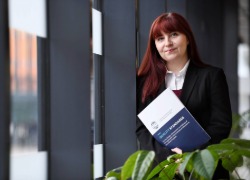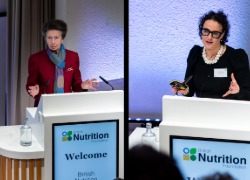Internship provides graduate with new career prospects
A Teesside University graduate is expanding his career horizons thanks to an innovative internship scheme.
Ross Chipper has been helping Innov8 Disposal Ltd to improve the efficiency of its computer systems after beginning a Knowledge Exchange Internship (KEI) with the Thornaby-based company.
Innov8 has also been working closely with the University on a scheme which will see old laptop computers recycled for use by community groups.
KEIs provide talented graduates with internships of up to 12 months in companies looking to solve a particular problem or implement a specific project.
The interns are able to draw upon the expertise of staff at the University to help them in their work.
Since November 2012, 35-year-old Ross, from Wolsingham, County Durham, has been working to combine Innov8 Disposal’s stock, booking and complaints systems into one streamlined electronic system.
Managing Director Louise McAlpine said: 'We’re very pleased with how well the KEI has gone and delighted with the work that Ross has done.'
Prior to beginning the KEI, Ross, who graduated from Teesside University in 2003 with a BSc (Hons) Media, Technology and Production, worked for Innov8 Disposal in IT support and had never previously attempted software programming.
He said: 'It was a really steep learning curve but I’ve thoroughly enjoyed the experience.
'That was primarily down to the people I’ve been working with at the University. They kept it very enjoyable which made it much easier to learn.
'I’ve learned skills now which I’ll be able to carry on and develop afterwards and this is something I want to branch off and carry on with in the future.'
Barry Hebbron, Senior Lecturer in the University’s School of Computing, said: 'Innov8 Disposal wanted help moving from paper based systems into an integrated electronic one.
'Through the KEI we were able to provide Ross with the advice and support to help them achieve this.
'The new system will help the business to improve its efficiency and identify areas of profitability.'
The new system is about to become operational and the company is predicting it will have an extremely positive impact on its efficiency and customer operations, ultimately saving it both time and money.
Innov8 Disposal specialises in the collection and disposal of unwanted IT equipment. The majority of the equipment is then either recycled or refurbished.
Louise added: 'The KEI is something that we would definitely consider doing again and we’re now hoping Ross’s KEI can be expanded into a Knowledge Transfer Partnership for future versions of the new system.'
Like KEIs, Knowledge Transfer Partnerships enable a graduate to work within a company and access key University expertise.
However, a KTP lasts for between 18 months to three years.
As well as working in partnership through the KEI, Innov8 is also helping Teesside University’s Environmental Committee and Entrepreneurs@Tees deliver an innovative community arts project based on recycled computers.
The project will be delivered in partnership with members of Access Space, the Sheffield-based computer arts lab.
Innov8 handles the removal and secure processing of the University’s retired and redundant IT equipment.
The company has donated 12 redundant laptops to the scheme which will see computing students work with Access Space members to help community group members learn to rebuild the computers themselves.
Each one will have open source software installed on it so that they are cheap to run and will enable community groups and organisations to access the internet and other digital tools without having to pay large amounts of cash.
The initiative is part of the work of the University Environmental Committee and Entrepreneurs@Tees, which aims to link student entrepreneurship with the environmental needs of the University.
Andy Price, the University’s Head of Enterprise Development and Education, said: 'We are delighted that Innov8 is helping us with this environmental initiative by the University.
“We are negotiating with local community groups who we hope will be able to take part in the project with us.”
Notes This project is part-financed by the European Regional Development Fund (ERDF), managed by the Department for Communities and Local Government, securing £300m investment.
The project will make a major contribution to the ambition of the ERDF Competitive Programme 2007-13 and by increasing the numbers and survival of business start ups in the region and increasing business productivity.


 Teesside academic leads the way in setting professional
...
Teesside academic leads the way in setting professional
... Teesside University leads new research into Roman Empire’s
...
Teesside University leads new research into Roman Empire’s
... Nourishing Tomorrow: my insights from the British Nutrition
...
Nourishing Tomorrow: my insights from the British Nutrition
...